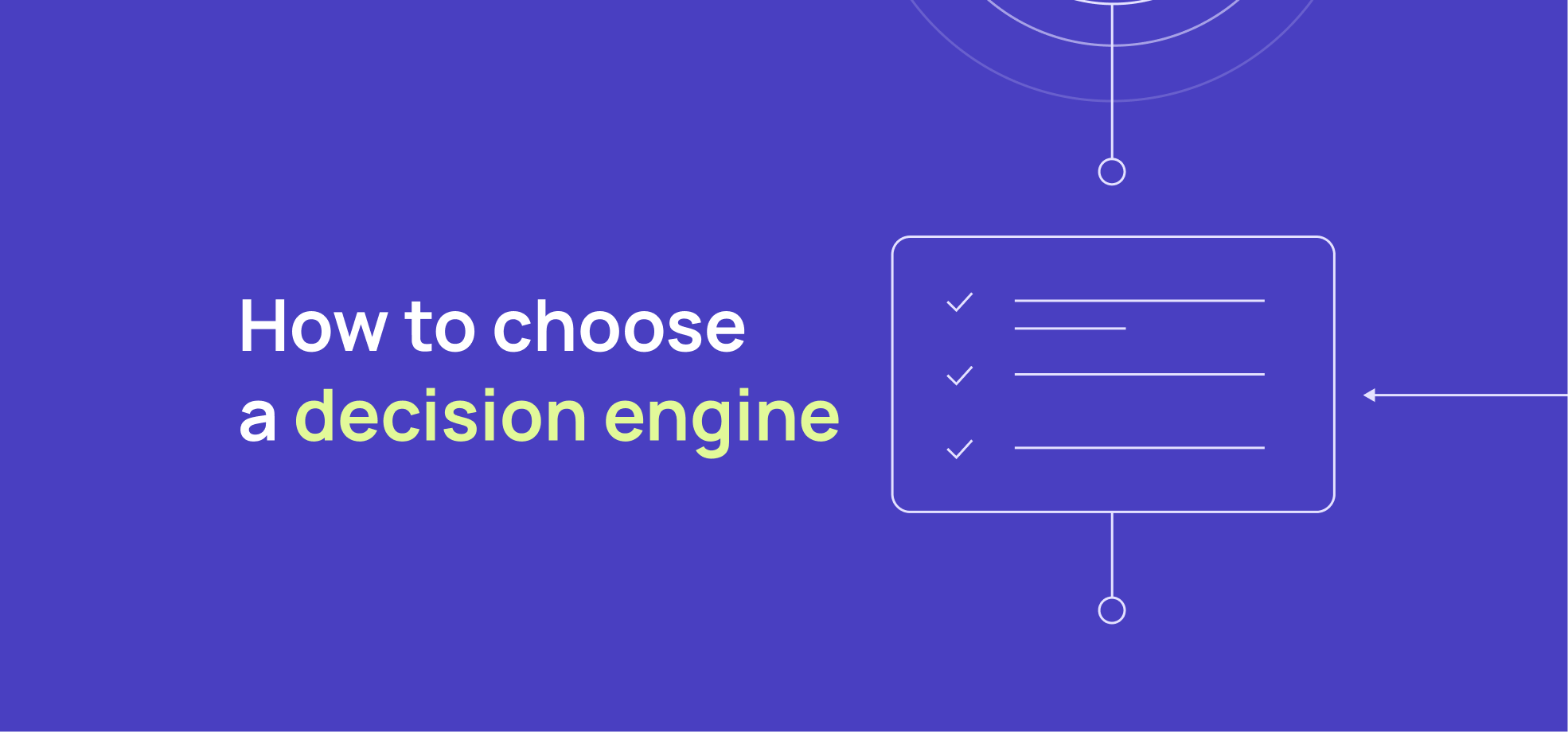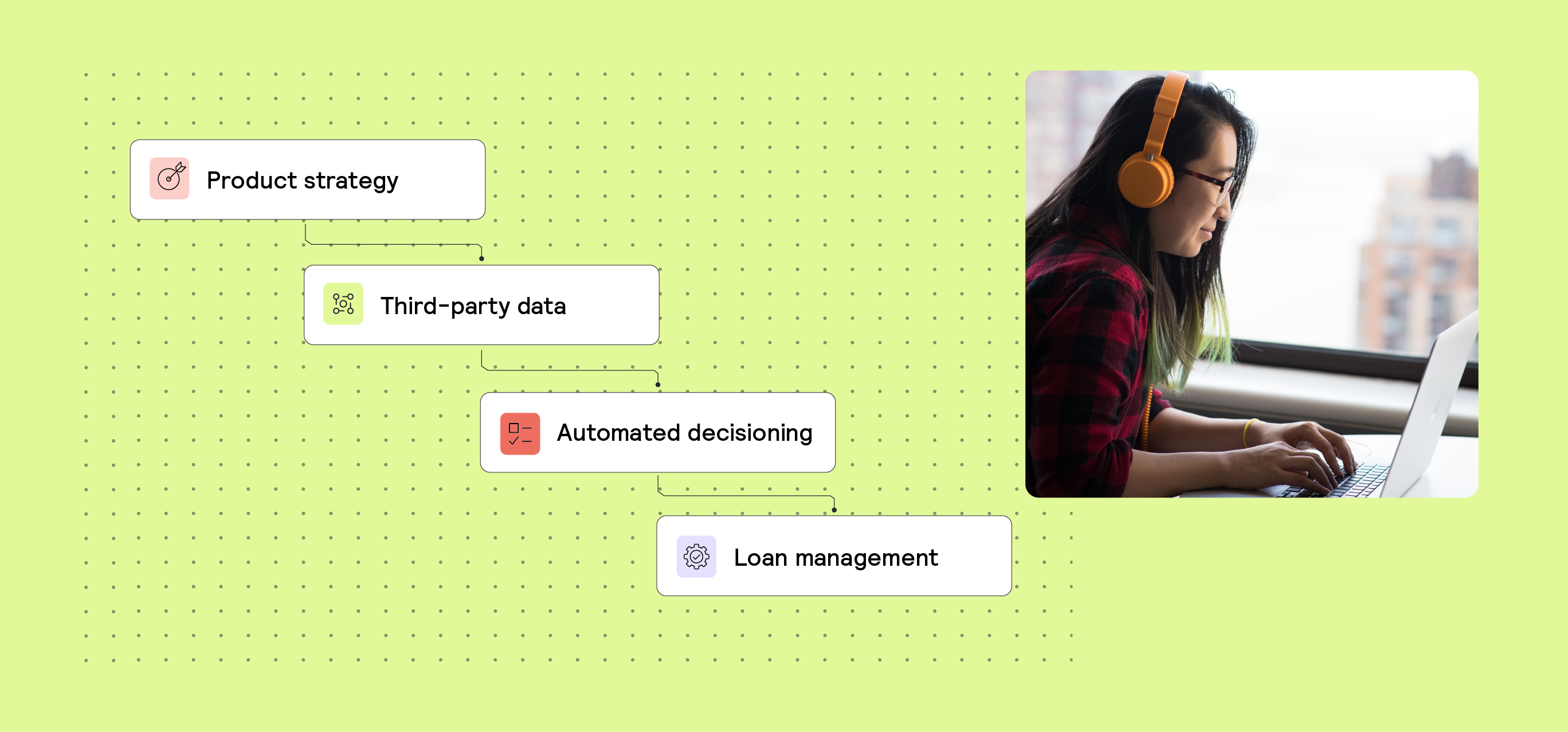Decision Engine, Fintech, Lending 4 min read
10 things risk experts look for in a modern decision engine

Modern decision solutions have changed the game for the finance industry. Organizations are revolutionizing their operations and boosting their competitive advantage by shifting from clunky legacy decision tools to advanced decision software.
But how do you find the best decision engine for your business? To help you make the right decision, this article summarizes the most important criteria risk experts evaluate when choosing a decision engine – including an evaluation guide to fast-track your evaluation process.
Key takeaways
- Modern decision engines boost accuracy, automation, and speed, enabling financial institutions to make smarter risk decisions while lowering operational costs.
- Choose a platform with a proven track record in your use case and stage of growth, supported by case studies and references from similar organizations.
- Look for user empowerment: no-code/low-code tools let non-technical teams manage workflows, while technical users can deploy advanced models.
- Prioritize engines that support experimentation, evidence-based testing, and real-time monitoring to continuously improve decision quality.
- Ensure seamless data integration, strong governance, and robust security to protect sensitive data and enable efficient collaboration.
- Evaluate pricing, implementation speed, and ongoing support to guarantee the solution scales with your organization without slowing operations.
The benefits of using a modern decision engine
Unlike traditional decision solutions, modern decision engines are equipped with advanced capabilities that help organizations:
- Increase the automation and accuracy of their decisions
- Generate faster, more competitive customer offers
- Unlock and grow into new customer segments
- Significantly reduce operational costs
Modern decision-making combines data and advanced analytics to generate highly accurate, automated decisions. Businesses can improve metrics like approval rates without increasing risk and, at the same time, provide customers with instant, personalized offers that grow competitive advantage.
In credit underwriting, for example, modern decision engines enable “better and more timely credit decisions and empower credit risk teams to operate with confidence in a more independent manner. In turn, better decisions lead to lower defaults and expand the market opportunity for lenders,” says Carlos Gonzalez-Cadenas at Index Ventures.
Not only do modern decision engines create a seamless decision-making process, but they can also be significantly cheaper and easier to integrate into a technology stack than traditional solutions – which tend to be much more complex.
How to choose the right decision engine for your business
Inspired by feedback from risk experts worldwide, here are the essential criteria you should consider when choosing a modern decision engine for your business:
1. Strong track record in your decision use case
The decision engine should have a strong track record in your current use case and the ability to power future ones.
At the same time, consider whether or not the provider has experience with companies in a similar stage of growth. In these instances, reviewing case studies or gaining insights from their existing users through reference calls can be helpful.
2. Ability to empower users through decision authoring
When choosing a decision engine, it is crucial that people across all levels of expertise – from your Data Scientists to the Head of Risk – feel comfortable using it. Additionally, your teams should be enabled to be as hands-on as they like when it comes to building and adjusting decision flows, from simple threshold setting to full workflow editing capabilities.
Thus, the ideal decision engine should have no-code and low-code capabilities that empower your non-technical users to easily use the platform and enable technical users to undertake more complex tasks.
3. Decision-making that supports all levels of sophistication
The decision engine should support the sophistication of your decisions - now and as it grows.
Early-stage organizations should be able to build simple rule-based decision flows quickly and easily. Those with more advanced decisions should be able to deploy statistical models directly on the platform, or integrate models hosted on third-party platforms into their decisions.
4. Evidence-based testing and experimentation
Your organization must be able to monitor and improve its decisions in real-time based on data and insights gained through the decision engine.
It also helps if you can validate your decision flows using test data before you set them live. Plus, experiment with different versions of a decision flow on subsets of a customer segment.
5. Flexible, seamless data integration options
The decision engine should offer pre-built data integrations related to your geography, such as credit bureaus and open banking providers like Plaid or Codat, that integrate effortlessly into your decisions.
If you have additional data needs, it should provide a custom integration solution.
6. Strong governance and collaboration structure
Having the proper guardrails in place will help your organization to make safer decisions. Therefore, the decision engine should allow you to set the permissions of various users depending on their role within your organization.
In addition, it needs to foster a collaborative environment, allowing users to work efficiently together to build, adjust, and approve decision flows.
7. Quick and straightforward technical implementation
Integrating the decision engine into your existing tool stack should be easy, allowing you to implement the solution as soon as possible.
Additionally, the decision engine should support the technical requirements of your organization's use cases as they scale, especially when it comes to decision volume and latency.
8. Gold-standard data protection and security certifications
It is crucial that the decision engine caters to the data protection laws surrounding your product(s) and has a best-in-class data security certification such as ISO or SOC 2.
9. High reliability and ongoing support
Service-level agreements should provide extremely high reliability and uptime guarantees and offer your organization round-the-clock support.
10. Flexible pricing options that suit your organization
Pricing should suit the stage of growth and requirements of your organization. An important consideration is the upfront costs – as these may hinder you from being able to implement a new decision solution quickly.
Ready for safer, smarter decisioning? Download our evaluation guide to quickly assess the suitability of a modern decision engine for your organization.
Disclaimer
This information provided in this article does not, and is not intended to constitute professional advice; instead, all information, content, and material are for general informational and educational purposes only. Accordingly, before taking any actions based upon such information, we encourage you to consult with the appropriate professionals.






